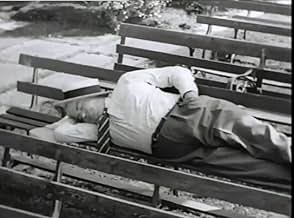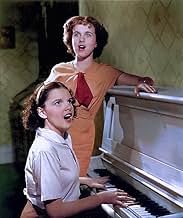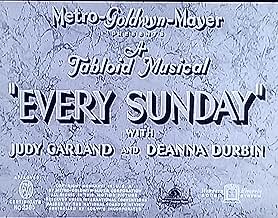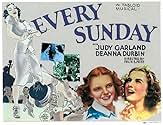Agrega una trama en tu idiomaTwo teenage girls lend their fantastic singing voices to the cause when the city council threatens to replace the orchestra led by one girl's grandfather as the regular entertainment at the ... Leer todoTwo teenage girls lend their fantastic singing voices to the cause when the city council threatens to replace the orchestra led by one girl's grandfather as the regular entertainment at the Sunday concert-in-the-park series.Two teenage girls lend their fantastic singing voices to the cause when the city council threatens to replace the orchestra led by one girl's grandfather as the regular entertainment at the Sunday concert-in-the-park series.
- Dirección
- Guionista
- Elenco
Clem Bevans
- Man playing checkers
- (sin créditos)
Jules Cowles
- Man in Audience
- (sin créditos)
Paul Irving
- Mr. Bixby
- (sin créditos)
Wright Kramer
- The Professor
- (sin créditos)
Thomas Pogue
- Mr. Barfogle
- (sin créditos)
Richard Powell
- Pop, Judy's Father
- (sin créditos)
Kathryn Sheldon
- Woman Gotten out of Bath
- (sin créditos)
Tammany Young
- Man Sleeping on Bench
- (sin créditos)
- Dirección
- Guionista
- Todo el elenco y el equipo
- Producción, taquilla y más en IMDbPro
Opiniones destacadas
This one reeler produced by MGM in 1936 showcases the talents of two of its young stars under contract, Judy Garland and Deanna Durbin. In a way, these short films were promotional trailers that featured new talent in front, or behind the camera. Felix Feist directed this one which was a way to promote the two talented stars to the public.
The story is simple enough. The orchestra that entertains in a public park every Sunday doesn't get the attention it deserves. Enter two music aficionados, Judy and Edna, who love to hear the band play conducted by one of their grandfathers. Two of the town's elders sensing there is no public for this type of entertainment have decided to cancel their Sunday concerts in favor of a more popular orchestra that will attract a wider audience.
The two girls embark in a promotional tour of their own doing what they only know, calling and running errands and being helpful to their neighbors in exchange for a promise they will attend the park concert next Sunday. Well, that day comes, and to their surprise, hardly anyone comes as the music starts. The two girls decide to take matters into their own and ask the conductor to play a song for them to sing. The result is clear, people all over the park flocks to hear the talented young singers, thus ensuring the orchestra's existence.
Of course, the only attraction of the short film is the inspired singing by the two stars who are wonderful in their rendition. Ms. Durbin's operatic voice blends well with Ms. Garland's natural one creating a lovely duet.
Don't miss it whenever it shows on TCM!
The story is simple enough. The orchestra that entertains in a public park every Sunday doesn't get the attention it deserves. Enter two music aficionados, Judy and Edna, who love to hear the band play conducted by one of their grandfathers. Two of the town's elders sensing there is no public for this type of entertainment have decided to cancel their Sunday concerts in favor of a more popular orchestra that will attract a wider audience.
The two girls embark in a promotional tour of their own doing what they only know, calling and running errands and being helpful to their neighbors in exchange for a promise they will attend the park concert next Sunday. Well, that day comes, and to their surprise, hardly anyone comes as the music starts. The two girls decide to take matters into their own and ask the conductor to play a song for them to sing. The result is clear, people all over the park flocks to hear the talented young singers, thus ensuring the orchestra's existence.
Of course, the only attraction of the short film is the inspired singing by the two stars who are wonderful in their rendition. Ms. Durbin's operatic voice blends well with Ms. Garland's natural one creating a lovely duet.
Don't miss it whenever it shows on TCM!
It was 1936 and MGM had acquired both Judy Garland and Deanna Durbin. Both about the same age, a little too old for kiddie movies, not quite ready for romantic leads yet. Add in the fact the neither of the girls had much experience in front of the camera. What do we do with them? Risk it all prematurely on a big budget full length feature? Nope...you start them both off in one short, designed to showcase each girls individual talent (Deanna was already being groomed as the "operatic" one, Judy as the "hot swing jazz" singer). And pull together a plot that is merely an excuse for us to hear these girls sing. Both girls went on to success in movies, each with their own particular style, but this was a part of their education and we, luckily, get to see it today.
Every Sunday is an eleven minute short subject featuring the talents of two of its young juvenile contract players, a pair who would develop into players of note in the future. It's interesting and entertaining to see the contrasting styles of Judy Garland and Deanna Durbin as they perform at a Sunday concert for Deanna's uncle.
Of course no one knew how big both of these young ladies would get to be. I've always wondered why Mayer kept Garland and let Durbin go to Universal. L.B. always had pretensions to culture and this was the guy who had Jeanette MacDonald at his studio and later on hired such lovely soprano voices as Jane Powell, Ann Blyth, Doretta Morrow, etc.
Judy certainly had her glorious career at MGM, but she paid a heavy price for it. Deanna, along with Abbott&Costello and several Gothic horror monsters preserved Universal pictures. She was smart enough to get out at the top and make it stick.
So, in their salad days, Deanna Durbin and Judy Garland.
Of course no one knew how big both of these young ladies would get to be. I've always wondered why Mayer kept Garland and let Durbin go to Universal. L.B. always had pretensions to culture and this was the guy who had Jeanette MacDonald at his studio and later on hired such lovely soprano voices as Jane Powell, Ann Blyth, Doretta Morrow, etc.
Judy certainly had her glorious career at MGM, but she paid a heavy price for it. Deanna, along with Abbott&Costello and several Gothic horror monsters preserved Universal pictures. She was smart enough to get out at the top and make it stick.
So, in their salad days, Deanna Durbin and Judy Garland.
Canthony is correct that this little short is just an excuse to hear a very young Judy Garland (fourteen years old!) singing with a slightly older (by one year) Deanna Durbin. But I must disagree with everything else he or she said, including the running time -- which is only about ten minutes, not twenty (a single-reeler).
The song is not her best, obviously; but it's enjoyable and definitely worth the ten minutes to watch on Turner. The duet with Durbin is quite interesting: two conflicting styles that nevertheless dovetail reasonably well.
The short is just a throwaway, but it's nowhere near as bad as the other reviewer made it out to be. Honestly, I enjoyed it.
Dafydd ab Hugh
The song is not her best, obviously; but it's enjoyable and definitely worth the ten minutes to watch on Turner. The duet with Durbin is quite interesting: two conflicting styles that nevertheless dovetail reasonably well.
The short is just a throwaway, but it's nowhere near as bad as the other reviewer made it out to be. Honestly, I enjoyed it.
Dafydd ab Hugh
In itself, this is a lightweight short feature with a predictable story, but it is well worth seeing as a pleasant part of cinema history. Seeing Deanna Durbin and Judy Garland together so early in their careers is a treat for anyone who has enjoyed their later pictures, and their energy and obvious talent more than make up for any lack of depth in the rest of the movie.
The plot is a simple one, with the two young women devoting themselves to saving a local concert series. What's interesting about it is seeing Durbin and Garland perform, since even at such a young age the difference in their styles is already pronounced. Deanna and Judy were both clearly ready for bigger opportunities.
This kind of feature probably doesn't hold an interest for a wide audience today, but for those who appreciate the classic musicals, it's worth seeing as a piece of movie history.
The plot is a simple one, with the two young women devoting themselves to saving a local concert series. What's interesting about it is seeing Durbin and Garland perform, since even at such a young age the difference in their styles is already pronounced. Deanna and Judy were both clearly ready for bigger opportunities.
This kind of feature probably doesn't hold an interest for a wide audience today, but for those who appreciate the classic musicals, it's worth seeing as a piece of movie history.
¿Sabías que…?
- TriviaThis film was not (as is often reported) a "screen test" of sorts produced by MGM to help the studio decide which of these two girls, Deanna Durbin or Judy Garland, to keep under contract. Durbin was released by MGM and signed by Universal prior to this movie's production. A blurb on 1 June 1936 in "The Hollywood Reporter" stated "Universal had changed Canadian-born Edna Mae Durbin's name to 'Dianna' [sic]." This movie, it appears, was not produced until at least July 1936, by which time Durbin had already been signed by Universal and cast in her debut vehicle, Three Smart Girls (1936). The reason she appeared in this film was reportedly due to a provision in her MGM contract which entitled the studio to request her services for up to 60 days following its termination, provided she was not already shooting a film at her new studio. As filming on "Three Smart Girls" was not scheduled to begin until September 1936, Durbin found herself back at MGM making this short with Garland. This is why, although her on-screen character is called "Edna" in the short (Deanna's real name), in the credits she is billed under the name by which she would soon become internationally famous, "Deanna".
- ErroresWhen the girls are singing, their mouths do not always match the soundtrack.
- ConexionesFeatured in Érase una vez en Hollywood (1974)
Selecciones populares
Inicia sesión para calificar y agrega a la lista de videos para obtener recomendaciones personalizadas
Detalles
- Fecha de lanzamiento
- País de origen
- Idioma
- También se conoce como
- Каждое воскресенье
- Locaciones de filmación
- Productora
- Ver más créditos de la compañía en IMDbPro
- Tiempo de ejecución11 minutos
- Color
- Relación de aspecto
- 1.37 : 1
Contribuir a esta página
Sugiere una edición o agrega el contenido que falta











